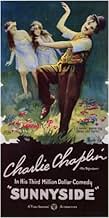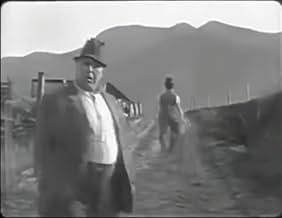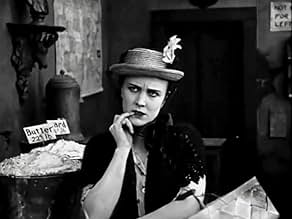Sunnyside
- 1919
- 34min
Agrega una trama en tu idiomaCharlie works on a farm from 4am to late at night. He gets his food on the run (milking a cow into his coffee, holding an chicken over the frying pan to get fried eggs). He loves the neighbo... Leer todoCharlie works on a farm from 4am to late at night. He gets his food on the run (milking a cow into his coffee, holding an chicken over the frying pan to get fried eggs). He loves the neighbor's daughter Edna but is disliked by her father. He rides a cow into a stream and is kicke... Leer todoCharlie works on a farm from 4am to late at night. He gets his food on the run (milking a cow into his coffee, holding an chicken over the frying pan to get fried eggs). He loves the neighbor's daughter Edna but is disliked by her father. He rides a cow into a stream and is kicked off. Unconscious, he dreams of a nymph dance. Back in reality a city slicker is hurt in ... Leer todo
- Farm Handyman
- (as Charlie Chaplin)
- Nymph
- (sin créditos)
- Slicker
- (sin créditos)
- Villager and Edna's Father
- (sin créditos)
- Small Role
- (sin créditos)
- Nymph
- (sin créditos)
- Nymph
- (sin créditos)
- Small Role
- (sin créditos)
- Small Role
- (sin créditos)
- Small Role
- (sin créditos)
- Small Role
- (sin créditos)
- Fat Man
- (sin créditos)
- Small Role
- (sin créditos)
- Nymph
- (sin créditos)
- Small Role
- (sin créditos)
- Young Man from the City
- (sin créditos)
- Fat Boy's Father
- (sin créditos)
- Dirección
- Guionista
- Todo el elenco y el equipo
- Producción, taquilla y más en IMDbPro
Opiniones destacadas
Some people were disappointed that Chaplin forced the Tramp into the unlikely role of a farmhand, forgetting that the very nature of the Tramp is that he is such an everyman that he can be placed in virtually every different kind of situation, from brick-layer to World War I soldier, and Chaplin can use his particular brand of comedy to deliver his clever political themes and brilliant slapstick.
Some of the situations and sequences don't work so well or run as smoothly as many of Chaplin's more famous ones, and there is a bizarre sequence involving some dancing nymphs, but it is interesting to consider how this early, experimental film foreshadows the work that Chaplin did later in much more famous and highly superior films like City Lights and The Kid. Throughout the film are what may be taken as examples of the exasperation that Chaplin has admitted to having during the production of the film, but to call is a total loss is missing the mark completely. Certainly not the best of Chaplin's early short films, but I don't think Chaplin ever made a real failure.
From his period after Mutual, 'Sunnyside' is not one of his very best and not even among the best of this particular period. As said with many of his post-Keystone efforts, it shows a noticeable step up in quality though from his Keystone period, where he was still evolving and in the infancy of his long career. The Essanay and Mutual periods were something of Chaplin's adolescence period where his style had been found and starting to settle. After Mutual the style had properly settled and the cinematic genius emerged. Something that can be seen in 'Sunnyside' though other efforts do it better.
The story is slight and a bit too busy and manic in places. It does get bogged down at times by padding and a few scenes that don't serve a lot of purpose. Not all the sequences work either.
It is agreed that the nymphs scene in particular is bizarre and doesn't fit with the rest of the content and story, that was a scene that could easily have been left out and it would not have affected anything at all.
On the other hand, 'Sunnyside' looks good, not amazing (though the opening shot for early Chaplin is remarkable) but it was obvious that Chaplin was taking more time with his work and not churning out countless shorts in the same year of very variable success like he did with Keystone. Appreciate the importance of his Keystone period and there is some good stuff he did there, but the more mature and careful quality seen here and later on is obvious.
'Sunnyside' is very funny and charming, if not one of Chaplin's substance or pathos-filled. Its best moments (like with the horse doctor) are hilarious with some clever, entertaining, remarkably inventive and well-timed slapstick and the charm doesn't get over-sentimental. It generally moves quickly and there is little dullness in sight. The second half is both hilarious and enchanting and the message isn't laid on too thick and has more potency than one would think.
Chaplin directs more than competently and the cinematic genius quality is emerging. He also, as usual, gives a playful and expressive performance and at clear ease with the physicality and substance of the role. The support is good and the chemistry charms.
Overall, good but not great. 7/10 Bethany Cox
Chaplin had practically invented the narrative slapstick comedy, but here he belittles the storytelling aspects that were now a comedy standard, curtailing descriptions of characters and places with "etc, etc, etc" and using a title card to bluntly announce the romantic subplot. Throughout the picture he makes use of his now most clichéd plot devices – the abused employee, the sophisticated love rival, the "it-was-all-a-dream" revelation – and, of course, numerous examples of his stock slapstick manoeuvre, the kick up the arse.
And yet, it appears Chaplin was incapable of deliberately making a bad picture. There are plenty of decent gags here, especially those at the beginning where Charlie thwarts his employer's attempts to get him out of bed. And even at the height of his sarcasm and hyperbole it seems Chaplin cannot help but work in gags and sub-gags which are genuinely funny. And for all its narrative laziness, Sunnyside is actually strong in its visual storytelling, beginning with the iris on the church spire to set the tone, then opening up the iris to reveal an exquisitely balanced shot of the village. And even the rushed ending is among Chaplin's sweetest in its delicate imagery.
And there's more; the all important statistic – Number of kicks up the arse: 24 (2 for, 22 against – can this be a record?)
¿Sabías que…?
- TriviaWhen the Farm Handyman (Charles Chaplin) drops the egg shell into the coffee pot, he is not simply surreptitiously disposing of the shell. Egg shells, being alkaline, decrease the bitterness of the coffee. This was a common practice for the time.
- ErroresIn the first scene, the Farm Handyman's (Charles Chaplin) boss gets up, puts his right shoe on, kicks sleeping Charlie awake, then goes back to bed. He gets up again to throw his other shoe at sleeping Charlie. The third time he gets up, he has both shoes on, even though he never retrieved the shoe he threw.
- Versiones alternativasThere is an episode, preserved on the 2003 DVD, of Chaplin attempting to shave Albert Austin with hilarious results. This cut segment can also be seen in Chaplin desconocido (1983).
- ConexionesFeatured in Charlie: The Life and Art of Charles Chaplin (2003)
Selecciones populares
Detalles
- Tiempo de ejecución34 minutos
- Color
- Mezcla de sonido
- Relación de aspecto
- 1.33 : 1
Contribuir a esta página





























